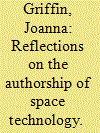| Srl | Item |
| 1 |
ID:
173399


|
|
|
|
|
| Summary/Abstract |
Marysia Zalewski's Feminist International Relations: Exquisite Corpse on feminism and global politics directly addresses matters of style, that is, questions of language and representation that foreground the invisible yet so palpable aspect of how meanings circulate. This article puts Zalewski's work in conversation with Trinh Minh-ha's D-Passage: The Digital Way and Lynda Barry's What It Is that similarly push the limits of how we craft feminist arguments. These feminists show how styles of writing and thinking, and how ideas gain shape to circulate matter in academic sites of knowledge as much as in art and culture. Building on these works, I put forward the thesis: to theorise is to feel out boundaries and question the questions we encounter that perennially relegate women as taint and malaise. I further explore this thesis by highlighting the visual dimensions of writing and thinking, in particular, what drawing, and drawing lines that shape ideas do. I focus on caricatures from the currently evolving North Korean nuclear crisis to loosen up the ways we go about thinking about war and politics wherein thinking is recognised not so much as a craft to be perfected but a democratic form of being in the world.
|
|
|
|
|
|
|
|
|
|
|
|
|
|
|
|
| 2 |
ID:
142577


|
|
|
|
|
| Summary/Abstract |
The paper offers a proposition in which the notion of the 'ownership' of outer space is substituted for that of 'authorship'. The notion of authorship draws attention to the processes of critical thinking, re-contextualization and resistances to space technology that take place in social domains where no clear role exists either as audience or user of space technology. The proposition responds in part to interventions made by artists in recent years into the workplaces of space technologists and, incrementally, into the imaginaries that inform the kinds of activities that happen in space. Artistic processes expose the reception of space technology at an intimate scale where the agencies of the viewer to observe, absorb and rethink converge with the shaping of space technology via state mediation and space agency imperatives. The constituency of collective authorship to which space technologies are subject is revealed in unexpected ways through artistic intervention that suggests a reappraisal of some of the terms of reference guiding space policy.
|
|
|
|
|
|
|
|
|
|
|
|
|
|
|
|